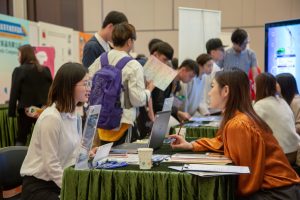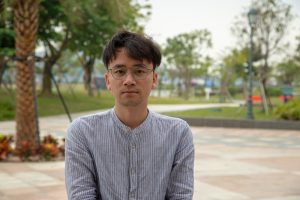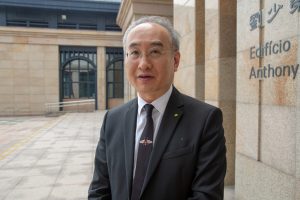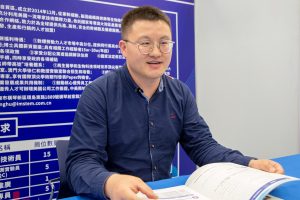Internship at Alibaba Headquarters
Carina Ku, a fourth-year student in the Department of Management and Marketing and a member of Chao Kuang Piu College, will begin a six-month internship at Alibaba’s headquarters in Hangzhou in June, in hopes of gaining hands-on marketing experience.
Ku has served two summer internships in Beijing, one of which was at Sina. Through these internship experiences, she gained some insights into the internet industry in mainland China. She says that while salaries in the mainland are generally lower than in Macao, employment options and prospects are better. She hopes to stay in the mainland after completing her internship and work for Alibaba or a large internet company. ‘I’ve also considered doing a master’s degree in marketing, but marketing has a lot of branches, like digital marketing, so I’d like to gain a few years of experience before deciding which direction to pursue,’ she says.
Becoming a Trainee Lawyer
Among the first batch of students to graduate from UM’s five-year bachelor ’s degree programme in law, which was launched in the 2014/2015 academic year and taught in both Chinese and Portuguese, is Shelly Cai, a member of Cheng Yu Tung College. She plans to take an internship in a local law firm after graduation. She hopes to pass the entrance examination and become a trainee lawyer. She expects to pass a series of courses and assessments in four to five years and eventually become a lawyer. She says that in addition to continuous learning at work, she will keep in touch with her Portuguese friends to practice her Portuguese language skills.
With the rapid development of the Guangdong-Hong Kong-Macao Greater Bay Area, there is a growing demand for cross-border legal services in the three regions. After becoming a lawyer in Macao, Cai plans to obtain qualifications to practice law in mainland China.
Setting Sights on the Sci-Tech Industry
Jeo Zhou, a third-year student in the master’s degree programme in e-commerce technology, says his top priority is to complete his thesis, which is due in August. After that he hopes to find a job that matches his skills. A native of Guangxi autonomous region, he has set his sights on Guangdong province, with Shenzhen as his first choice because of the abundant opportunities, the high average salary compared to other mainland cities, and the entrepreneurial environment in the city.
‘I hope to find a job in the internet industry in Shenzhen. Big companies like Tencent, ZTE, and Huawei are all based in Shenzhen. They offer many positions for people with a background in computer science,’ he says. Zhou hopes to find a job that allows him to apply his skills in data mining and analysis. Apart from Shenzhen, Hangzhou is also a city he will consider for its highly developed internet industry.
To help graduates explore opportunities in Hengqin, UM and the Management Committee of Hengqin New Area jointly organised a job fair, offering job vacancies in science and technology and finance sectors. Uni Wang, a fourth-year student of biomedical sciences and a member of Cheng Yu Tung College, attended the fair to learn about job vacancies in Hengqin.
She is looking for jobs related to her major, while also considering the possibility of studying for a master’s degree abroad. ‘I don’t want to go back to my hometown, Hunan province, after graduation,’ she says. ‘I think it’s a good idea to try to find a job in the Greater Bay Area, because this area has great potential. I want to go out and experience more cities when I graduate.”
Employers Value Integrity Most
Sidney Cheng, managing partner of Deloitte China Macao Office, was invited by the Student Affairs Office to give a career talk at UM. He says creativity, courage, and integrity are the three qualities he values most in candidates, with integrity being the most important. ‘Integrity is our most important asset if we are to contribute to our company and our customers,’ he says.
Cheng believes that university graduates from Macao who have interned in the mainland will undoubtedly score points with employers. He says even if a graduate decides to stay in Macao, he or she should be aware of the increasing cooperation between Guangdong, Hong Kong and Macao. For instance, Deloitte China’s staff in Macao need to travel to Hong Kong, Guangzhou, Shenzhen and other major cities in China from time to time to work with local colleagues. He encourages graduates to keep abreast of the developments in other cities in the region and enhance their competitiveness in science and technology.
Skills and Personality Both Important
Henry Hu, assistant to the president of ImStem Biotechnology, who attended a job fair at UM for companies from Hengqin New Area, says his company will first evaluate the candidates’ professional skills, but will also consider whether their personality traits make them the right fit for the company.
Hu says that research-related positions require intense concentration and a perfectionist personality, while sales positions require an outgoing personality and good communication skills. Because his company has operations in both China and the United States, and researchers working in Hengqin may need to travel to the US on business trips, English proficiency is also an important consideration.
The years in college offer a precious window for students to explore their interests and talents and prepare themselves for the future. We hope all those who are about to graduate will keep up their spirits, upgrade their knowledge, and create the future of their dreams one step at a time.
Source: My UM







